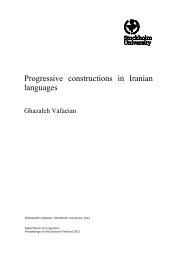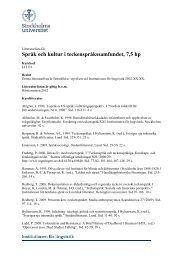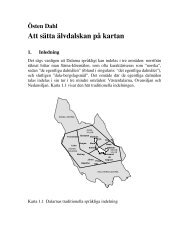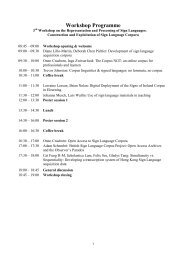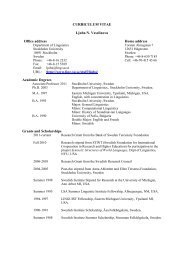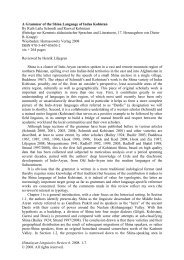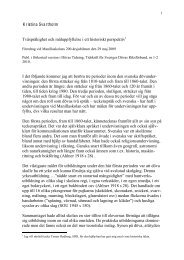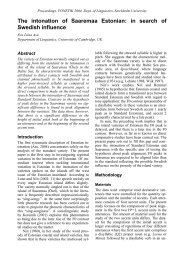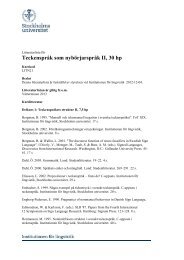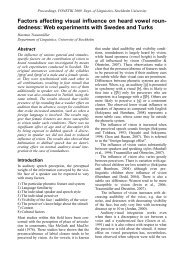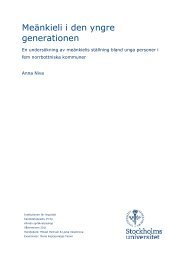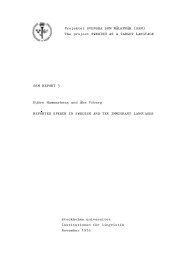Proceedings Fonetik 2009 - Institutionen för lingvistik
Proceedings Fonetik 2009 - Institutionen för lingvistik
Proceedings Fonetik 2009 - Institutionen för lingvistik
You also want an ePaper? Increase the reach of your titles
YUMPU automatically turns print PDFs into web optimized ePapers that Google loves.
<strong>Proceedings</strong>, FONETIK <strong>2009</strong>, Dept. of Linguistics, Stockholm Universitycoarticulation and sandhi phenomena should betreated.Another tricky task for pronunciation editorsis to characterize the pronunciation of thephonetic signs. As one subject pointed out in acomment, descriptions like ‘voiced bilabialfricative’ do not tell you much unless you havebeen through an elementary course of phonetics.Neither do written example words servetheir purpose to users without knowledge of thelanguages in question. It is quite evident thataudio recordings of the written example words—in various languages for each sign, thus illustratingthe phonetic range of it—would reallyadd something.The panel favoured original language pronunciationboth in transcriptions (69% or more)and in audio recordings (67%). At least in Sweden,learners of foreign languages normally aimat a pronunciation as native-like as possible.However, this might not always be valid for encyclopediausers. When speaking your mothertongue, pronouncing single foreign words in atruly native-like way may appear snobbish oraffected. Newsreaders usually do not changetheir base of articulation when encountering aforeign name. A general solution is hard tofind. Since you do not know for what purposeusers are seeking pronunciation advice, adoptinga fixed level of swedicization would not besatisfactory. The Oxford BBC Guide topronunciation has solved this problem bysupplying two pronunciations: an anglicizedone, given as ‘respelled pronunciation’, andanother one, more close to the originallanguage, transcribed in IPA.Interim strategiesOne question was an attempt to explore the thestrategies most frequently used by the subjectswhen they had run into words they did notknow how to pronounce, in other words to findout what was going on in their minds beforethey began to seek pronunciation advice. Theoptions and their scores were as follows:(a) I guess at a pronunciation and then use itsilently to myself: 51%(b) I imagine the word pronounced in Swedishand then I use that pronunciation silentlyto myself: 16%(c) I can’t relax before I know how to pronouncethe word; therefore, I avoid allconjectures and immediately try to findout how the word is pronounced: 22%(d) I don’t imagine any pronunciation at all butmemorize the image of the written wordand link it to the concept it represents:11%.It can be doubted whether (d) is a plausible optionfor people using alphabetical script. Onesubject commented that it was not. Anyway, itseems that it would be more likely to be usedby those brought up in the tradition of iconographicscript. Researchers of the reading processmight be able to judge.The outcome is that the panel is ratherreluctant to use Swedish pronunciation—evententatively—for foreign words, like saying forexample [ˈʃɑːkəˌspeːarə] for Shakespeare or[ˈkɑːmɵs] for Camus, pronunciations that aresometimes heard from Swedish children.Rather, they prefer to make guesses like[ˈgriːnwɪtʃ] for Greenwich, as is frequently donein Sweden.ConclusionSweden has grand traditions in the field of presentingpronunciation in encyclopedias, but thisdoes not mean that they should be left unchanged.It is quite evident from the panel’s answersthat the principle of not giving pronunciationfor first names is totally outdated.The digital revolution provides new possibilities.Not only does it allow for showingmore than one pronunciation, e.g., one standardand one regional variety, since there is nowspace galore. Besides allowing audio recordingsof entry headings, it makes for better descriptionsof the sounds represented by the varioussigns, by completing written examplewords in various languages with sound recordingsof them.IPA transcriptions should be favoured whenproducing new encyclopedias. The Internet hascontributed to an increased use of the IPA, especiallyon the Wikipedia, but since the authorsof those transcriptions do not always have sufficientknowledge of phonetics, the correctnessof certain transcriptions ought to be questioned.The extent to which transcriptions should beused, and how detailed they should be must dependon the kind of reference book and of thegroup of users aimed at. Nevertheless, accountmust always be taken of the many erroneouspronunciations that exist and continue tospread, e.g., [ˈnætʃənəl] for the English wordnational, a result of Swedish influence.218



